#gender activists
Text
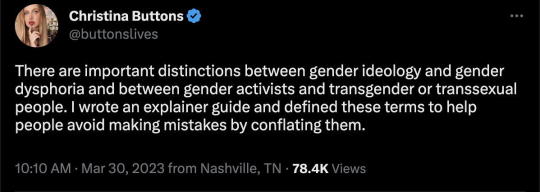
By: Christina Buttons
Published: Mar 30, 2023
When discussing and debating transgender issues, many people have a tendency to conflate terms that are related but have separate meanings. The two most common misconceptions involve attributing the actions of some gender activists to the entire population of transgender or transsexual people and conflating a set of radical beliefs about gender identity, commonly called “gender ideology,” with a psychiatric condition known as gender dysphoria.
These mistakes are most often due to ignorance regarding the differences and an overgeneralization about a group of people based on the actions of some individuals within that group. In gender-critical discourse, the worst and most extreme examples the transgender community has to offer frequently dominate our social media timelines, but this is not a representative sample of the millions of people who identify as transgender globally.
This is further perpetuated by an algorithm bias filling our timelines with outlier events presented to us as if they were the norm, and the media multiplier effect, which is the tendency of media coverage to amplify certain messages or ideas, often at the expense of others.
Accuracy is essential not only for effectively communicating your ideas, but also for avoiding the pitfall of identity politics, which involves assigning blame or attributing specific characteristics to entire populations of people. This is especially common in debates surrounding transgender issues due to the highly contentious and volatile nature of the discourse.
To avoid these errors, it is crucial to learn the distinctions between gender ideology and gender dysphoria, and between gender activists and transgender or transsexual people. But first, we have to define the terms and explore the nature of belief.
* * *
Gender Ideology and the nature of belief
An ideology is a set of beliefs that shape an individual's or group's worldview.
The difference between a belief and a fact is that a belief is a subjective interpretation or conviction about something that may or may not be supported by evidence or experience, while a fact is an objective aspect of reality that can be verified through direct observation or measurement.
Religions can also be considered ideologies or belief systems. For example, concepts such as God, the soul, and the afterlife are not directly observable or measurable in the way that the properties of matter or energy are, but people may believe in them anyway. Faith refers to a belief or trust in something or someone without empirical proof or evidence.
Gender ideology is a set of beliefs about sex and gender that in recent years have become widespread and mainstream, despite a lack of empirical evidence to support them.
This belief system is derived from a postmodern social theory that emerged in university Humanities departments in the 1990s called Queer Theory. Postmodern philosophy explicitly rejects the scientific pursuit of objective truth, and the scholarship produced by postmodernism has been widely criticized as frivolous and unscientific.
Here are some common examples of ideological beliefs about gender:
Both gender and biological sex are “fluid.”
Both gender and biological sex are a social construct.
Biological sex is not binary but best represented as a “spectrum.”
Biological sex and/or gender is “assigned at birth” rather than observed and recorded.
Everyone has a “gender identity” determined by male and female stereotypes.
One can literally be “born in the wrong body” or have a “gender identity” that is misaligned with the body.
Being “trans” is innate and biological, similar to being gay.
“Gender identity” is akin to “brain sex” or “neurological sex” which can and should override one’s biological sex.
One can literally become the opposite sex through self-designation or chemical and surgical interventions.
Children who do not conform to the stereotypes associated with their sex are transgender and should be socially and medically affirmed as such.
A vast variety of gender identities exist including nonbinary and genderfluid.
Any criticism of these beliefs is akin to “violence” or “genocide” of the trans community.
These claims are all verifiably false, but people choose to believe them anyway, likely because they have been given false information or perceive that these beliefs align with their values. These beliefs are also heavily promoted by large and influential Civil Rights and Gay Rights organizations, which pivoted to championing “trans rights” after gay marriage was legalized federally in 2015.
Beliefs and ideas can be infectious and can spread rapidly, especially in the age of the Internet, which become strengthened with widespread adoption. Gender ideology, when dressed up as a social justice and human rights movement, is particularly attractive to people.
When we talk about gender ideology, we are talking about beliefs that have to do with gender, “gender identity,” and biological sex that are untrue, but are nonetheless held fervently and have great significance to people. This is because people become emotionally invested in their beliefs, and find ways to rationalize them.
As Michael Shermer said in his classic book, Why People Believe Weird Things, “Smart people believe weird things because they are skilled at defending beliefs they arrived at for nonsmart reasons.”
Anybody can hold ideological beliefs about gender, including non-transgender people, who often call themselves “allies.” When speaking about someone who holds ideological beliefs about gender, we often refer to them as gender ideologues or proponents of gender ideology.
Another important reminder is that beliefs are not necessarily fixed. People change their minds all the time when they’re exposed to new information, usually when the source is perceived to be neutral and trustworthy. This is because people tend to be more receptive to ideas that do not cause them to feel defensive.
Gender Dysphoria
Gender dysphoria is a psychiatric condition marked by persistent distress with one’s biological sex and an intensely held desire to be perceived as the opposite sex. Historically, gender dysphoria was a rare condition that affected roughly 1 in 10,000 males and 1 in 30,000 females. As of 2022, the number of people aged 13 and up who identify as transgender in the United States is closer to 1 in 167.
This is because, in recent years, the significance of gender dysphoria as a meaningful diagnosis has been deemphasized in favor of a broader definition of what it means to be transgender, or “gender diverse,” which is now defined as an “umbrella term” that includes mere nonconformity to sex-based stereotypes, and is open for anybody to self-identify into.
Contrary to popular belief, being transgender is not innate or biological. There is no brain, blood, or other objective test that distinguishes a trans-identified person from someone who does not identify as trans.
Due to the prevalence of gender ideology in mainstream culture, there are many different reasons why someone might identify as transgender. Transgender identities can be influenced socially, induced by trauma or internalized homophobia, confused for autistic traits or psychiatric disorders, confounded by same-sex attraction, or some combination of all these. There is also evidence that some adult-onset transgender identities are adopted as part of a paraphilia, including autogynephilia and autoandrophilia.
For many, gender dysphoria is a condition that causes individuals great distress. We should show compassion towards these people because they often suffer from comorbidities such as depression and anxiety. Sometimes gender dysphoria resolves on its own or can be confused with other conditions. Like beliefs, feelings of gender dysphoria are also not necessarily fixed, as we know from detransitioners and research on desistance in children. But for some adults, their distress is alleviated by presenting as the opposite sex and they can lead happy lives. The bottom line is, the experience of having gender dysphoria or being transgender is very individualized and sometimes but not always ideologically influenced.
We also know that the experience of gender dysphoria existed long before the emergence of gender ideology. The first documented cases of individuals who underwent medical interventions to appear as the opposite sex were described in the mid-20th century.
As depicted in the Venn diagram, holding ideological beliefs about gender is not dependent on having gender dysphoria, and having gender dysphoria is not dependent on holding ideological beliefs about gender.
Being transgender or transsexual, as some prefer to be called, is not a monolithic experience and includes diverse points of view. While a majority of transgender people would probably identify as politically left-leaning, there are many transsexuals who hold right-leaning or libertarian views and are critical of transgender activism that promotes radical ideological beliefs.
A group formed by transsexuals at the Gender Dysphoria Alliance is working to reclaim the narrative on gender dysphoria as a meaningful diagnosis from transgender activists who wish to eradicate it and other so-called “barriers” to medical transition services.
There are many transsexuals who do not deny their biology but choose to present in a way that makes them feel most comfortable, and they do not make requirements of anyone to call them by their preferred pronouns. They also fully agree that children are too young to understand and consent to the irreversible, life-altering effects of medical transition. It seems likely that more transsexuals who share these beliefs would speak up if they weren’t treated so cruelly by people on all sides of the debate.
There are 1.64 million people who identify as transgender in the United States alone, and millions more globally. Most of them are not interested in disrupting society by erasing sex in law; they are just trying to integrate into society.
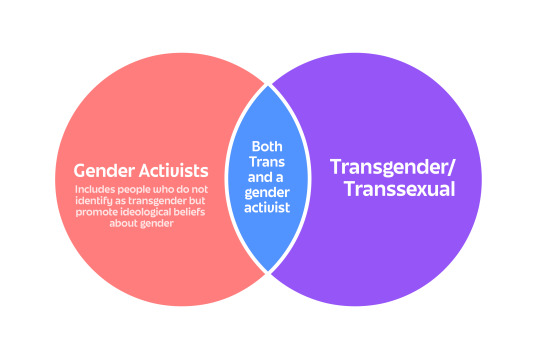
A vocal minority who operate heavily on social media and promote ideological beliefs about gender should be referred to as gender activists, as they may or may not be transgender themselves.
It is important to direct criticism where it belongs – to gender ideology and to the specific actions of individual gender activists, not to transgender people as a whole. By making these distinctions, you can ensure that your ideas are conveyed accurately and effectively without stereotyping an entire group.
==
"large and influential Civil Rights and Gay Rights organizations"
^ former Civil Rights and Gay Rights organizations. Organizations like the ACLU now call for censorship of speech and opacity of policy, while organizations like HRC, Stonewall and LGBT Consortium now demonize same-sex attraction.
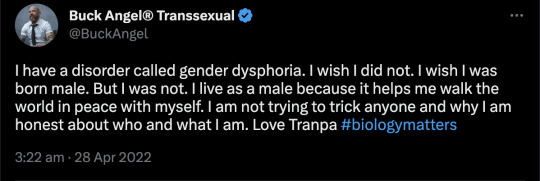
This is what I've been saying. Gender ideology and gender activists do not represent people with the very real disorder, gender dysphoria. Gender ideology colonized, took over, deleted gender dysphoria entirely, and is now wearing "trans" like a Face/Off mask.
https://www.hrc.org/resources/glossary-of-terms
Transgender | An umbrella term for people whose gender identity and/or expression is different from cultural expectations based on the sex they were assigned at birth.
(i.e. anyone who is not a stereotype.)
So not only do these organizations not represent lesbian, gay or bisexual people any more, they don't even represent people like Buck Angel any more either.
Opposing gender cultists isn't "anti-trans." It's opposing a ideology that's playing games with people's - particularly children's - bodies, minds and lives for political purposes. You can't support people with gender dysphoria without opposing gender ideology, because the latter has invaded and corrupted the language, the healthcare (including mental health) services, and importantly, the societal empathy and trust that people with gender dysphoria used to have and rely upon.
BTW, don't miss the gender ideology beliefs listed above which contradict each other as much as religious beliefs about gods.
#Christina Buttons#gender ideology#queer theory#gender activists#gender cult#genderwang#religion is a mental illness
36 notes
·
View notes
Text
"all men are evil" is radfem/terf rhetoric, but clarifying "all cis men" because you want to signal that you're not transphobic doesn't work because it's still deeply rooted in radfem beliefs. It's saying you believe there's something inherently evil in being born/assigned "male", and you carry it over in how you treat ppl who transition in or out of that gender. "All cis men are evil", is gender essentialist and you can't get around that.
Fucking tired of ppl who think their terf soundbites with a fresh coat of paint are sooo progressive
#grumble grumble#refollowed someone who always gets lauded as such a great activist hoping hed moved past his bullshit#but nope hes still insufferable in his weird pocket gender essentialist way#unfortunately like so many ppl are
32K notes
·
View notes
Text
so one of the things that's so horrifying about birth control is that you have to, like, navigate this incredibly personal choice about your body and yet also face the epitome of misogyny. like, someone in the comments will say it wasn't that bad for me, and you'll be utterly silenced. like, everyone treats birth control like something that's super dirty. like, you have no fucking information or control over this thing because certain powerful people find it icky.
first it was the oral contraceptives. you went on those young, mostly for reasons unrelated to birth control - even your dermatologist suggested them to control your acne. the list of side effects was longer than your arm, and you just stared at it, horrified.
it made you so mentally ill, but you just heard that this was adulthood. that, yes, there are of course side effects, what did you expect. one day you looked up yasmin makes me depressed because surely this was far too intense, and you discovered that over 12,000 lawsuits had been successfully filed against the brand. it remains commonly prescribed on the open market. you switched brands a few times before oral contraceptives stopped being in any way effective. your doctor just, like, shrugged and said you could try a different brand again.
and the thing is that you're a feminist. you know from your own experience that birth control can be lifesaving, and that even when used for birth control - it is necessary healthcare. you have seen it save so many people from such bad situations, yourself included. it is critical that any person has access to birth control, and you would never suggest that we just get rid of all of it.
you were a little skeeved out by the implant (heard too many bad stories about it) and figured - okay, iud. it was some of the worst pain you've ever fucking experienced, and you did it with a small number of tylenol in your system (3), like you were getting your bikini line waxed instead of something practically sewn into your body.
and what's wild is that because sometimes it isn't a painful insertion process, it is vanishingly rare to find a doctor that will actually numb the area. while your doctor was talking to you about which brand to choose, you were thinking about the other ways you've been injured in your life. you thought about how you had a suspicious mole frozen off - something so small and easy - and how they'd numbed a huge area. you thought about when you broke your wrist and didn't actually notice, because you'd thought it was a sprain.
your understanding of pain is that how the human body responds to injury doesn't always relate to the actual pain tolerance of the person - it's more about how lucky that person is physically. maybe they broke it in a perfect way. maybe they happened to get hurt in a place without a lot of nerve endings. some people can handle a broken femur but crumble under a sore tooth. there's no true way to predict how "much" something actually hurts.
in no other situation would it be appropriate for doctors to ignore pain. just because someone can break their wrist and not feel it doesn't mean no one should receive pain meds for a broken wrist. it just means that particular person was lucky about it. it should not define treatment.
in the comments of videos about IUDs, literally thousands of people report agony. blinding, nauseating, soul-crushing agony. they say things like i had 2 kids and this was the worst thing i ever experienced or i literally have a tattoo on my ribs and it felt like a tickle. this thing almost killed me or would rather run into traffic than ever feel that again.
so it's either true that every single person who reports severe pain is exaggerating. or it's true that it's far more likely you will experience pain, rather than "just a pinch." and yet - there's nothing fucking been done about it. it kind of feels like a shrug is layered on top of everything - since technically it's elective, isn't it kind of your fault for agreeing to select it? stop being fearmongering. stop being defensive.
you fucking needed yours. you are almost weirdly protective of it. yours was so important for your physical and mental health. it helped you off hormonal birth control and even started helping some of your symptoms. it still fucking hurt for no fucking reason.
once while recovering from surgery, they offered you like 15 days of vicodin. you only took 2 of them. you've been offered oxy for tonsillitis. you turned down opioids while recovering from your wisdom tooth extraction. everything else has the option. you fucking drove yourself home after it, shocked and quietly weeping, feeling like something very bad had just happened. the nurse that held your hand during the experience looked down at you, tears in her eyes, and said - i know. this is cruelty in action.
and it's fucked up because the conversation is never just "hey, so the way we are doing this is fucking barbaric and doctors should be required to offer serious pain meds" - it's usually something around the lines of "well, it didn't kill you, did it?"
you just found out that removing that little bitch will hurt just as bad. a little pinch like how oral contraceptives have "some" serious symptoms. like your life and pain are expendable or not really important. like maybe we are all hysterical about it?
hysteria comes from the latin word for uterus, which is great!
you stand here at a crossroads. like - this thing is so important. did they really have to make it so fucking dangerous. and why is it that if you make a complaint, you're told - i didn't even want you to have this in the first place. we're told be careful what you wish for. we're told that it's our fault for wanting something so illict; we could simply choose not to need medication. that maybe if we don't like the scraps, we should get ready to starve.
we have been saying for so long - "i'm not asking you to remove the option, i'm asking you to reconsider the risk." this entire time we hear: well, this is what you wanted, isn't it?
#where's the word woman in this u might wonder if u suck#good news i am nonbinary and have a uterus so that is something that can happen#im also gender fluid tho which means im immune to certain psychic damage bc if u call me a woman i'll be like <3 okay <3#writeblr#the tightrope of ''ppl need access to this''#and like also#''what the fuck is going on over there'' is like. so difficult as an activist#i was <3 punctured <3 during mine#and almost bled out on the table :) they didn't have anyone standing by bc it's ''just a little insertion''#so i started crashing and i vaguely remember apologizing for the fuss as i heard my heart rate monitor start going <3 tachycardic <3#she wasn't even a bad doctor tbh#ps btw the reason i even HAD a heart monitor is that i have a genuine heart condition and they knew GOING IN that there was a chance#i'd crash on the table#like my heart just likes to do fun little tricks and <3 stop working <3 (i do not want to discuss the specifics ty i am okay im ontop of it#and they were like 'oh u will be fine' and then she did do a puncture thru my uterus . pop!#and im sitting there dizzy and feeling my heartrate start to drop bc it feels almost. beautiful. like. the whole ground just#woosh! out from under you. and shit is like grey's anatomy. i'm looking up at her grey eyes#she's old she wears this nice shawl she's like got Cool Lesbian vibes and people are sprinting into the room#from other parts of the clinic unrelated to me. while the monitor is like a little aria singing#and shes like hey youre okay stay awake stay with me something went wrong we have to keep trying#and i remember thinking - i was trying to think of nice things. i have so many beautiful places that now overlap#with this terrible memory#i became dimly aware that there was too much on her wrists and hands. like#that was too many liters#and then when they had finished all this. i packed up and drove myself home#i have had (bad thing) happen to me. and the same feeling happened after#that numb almost lamblike bleating. you cry without noise. like. ur body is so shocked and ur mind so empty#you just stare at the road and everything everything is happening behind glass and static and you are standing so far away from it#while you hold ur hands at 10 and 2. and something in ur brain is SCREAMING at you - IT WAS BAD AND IT SHOULDNT HAVE HAPPENED#and ur just watching the alarms in your body going off and youre thinking. a little pinch! ha. i think i just lost something important.
9K notes
·
View notes
Text
Hey major shout-out to my fellow trans Jews. This year has been hell and it's hard not to feel like we've been completely abandoned, betrayed, shut out, and made unsafe across the full political spectrum.
I'm so sorry; we deserved better. I hope you're okay and standing strong - we will get through this together 🕎 🏳️⚧️ ✡️
#the right either actively or passively wants us dead or disappeared because of our genders#and the left apparently wants us dead or disappeared for being Jews#where can we go?#who can we turn to?#who can we rely on but ourselves?#it's terrifying and excruciating#I'm so tired of begging people to see me as a person#trans advocacy is so important right now and being in trans community is so vital#and yet far too many trans activists and community leaders were cheering on the deaths of my people not three weeks ago#pan-Jewish solidarity is so important right now and being in Jewish community is so important#and yet a disturbing number of the strongest voices advocating for Jewish people's humanity and right to self-determination#are also very right-wing#and refuse to see not even the truth of our lived experiences but fail entirely to see our humanity as trans people at all#so again I ask: where are we supposed to go??
532 notes
·
View notes
Text
hot take but “kill all men” and similar proclamations that all men are evil and inherently bad is not feminist and is only making things worse, pushing men to become like Andrew Tate. it is also removing accountability from men who are actually bad; “you can’t get mad at me, it’s in my nature!”
you are not helping anyone. not yourself, not women, not men. you are just hurting actual good people while the people you are trying to hurt are enabled. you are not turning people away from misogyny, you are pushing them towards it.
hating all men is not cool. it is not feminist. no issue is solved by simply reversing who is being affected.
#psa#important#feminism#social issues#gender#activism#kam#transgender#trans safe#activist#feminist#kill all males#kill all men#trans man safe
218 notes
·
View notes
Text
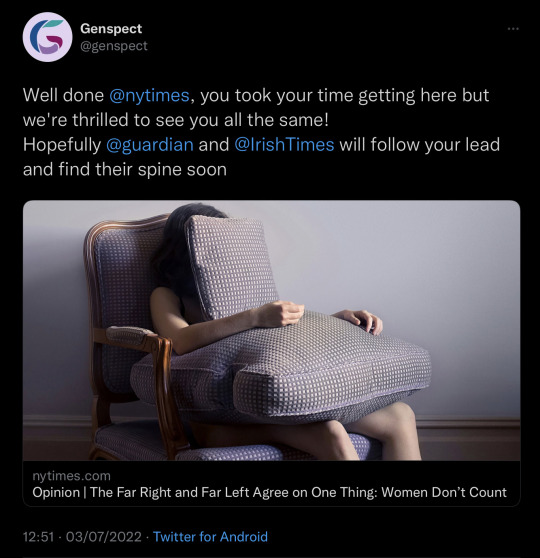
Perhaps it makes sense that women — those supposedly compliant and agreeable, self-sacrificing and everything-nice creatures — were the ones to finally bring our polarized country together.
Because the far right and the far left have found the one thing they can agree on: Women don’t count.
The right’s position here is the better known, the movement having aggressively dedicated itself to stripping women of fundamental rights for decades. Thanks in part to two Supreme Court justices who have been credibly accused of abusive behavior toward women, Roe v. Wade, nearly 50 years a target, has been ruthlessly overturned.
Far more bewildering has been the fringe left jumping in with its own perhaps unintentionally but effectively misogynist agenda. There was a time when campus groups and activist organizations advocated strenuously on behalf of women. Women’s rights were human rights and something to fight for. Though the Equal Rights Amendment was never ratified, legal scholars and advocacy groups spent years working to otherwise establish women as a protected class.
But today, a number of academics, uber-progressives, transgender activists, civil liberties organizations and medical organizations are working toward an opposite end: to deny women their humanity, reducing them to a mix of body parts and gender stereotypes.
As reported by my colleague Michael Powell, even the word “women” has become verboten. Previously a commonly understood term for half the world’s population, the word had a specific meaning tied to genetics, biology, history, politics and culture. No longer. In its place are unwieldy terms like “pregnant people,” “menstruators” and “bodies with vaginas.”
Planned Parenthood, once a stalwart defender of women’s rights, omits the word “women” from its home page. NARAL Pro-Choice America has used “birthing people” in lieu of “women.” The American Civil Liberties Union, a longtime defender of women’s rights, last month tweeted its outrage over the possible overturning of Roe v. Wade as a threat to several groups: “Black, Indigenous and other people of color, the L.G.B.T.Q. community, immigrants, young people.”
It left out those threatened most of all: women. Talk about a bitter way to mark the 50th anniversary of Title IX.
The noble intent behind omitting the word “women” is to make room for the relatively tiny number of transgender men and people identifying as nonbinary who retain aspects of female biological function and can conceive, give birth or breastfeed. But despite a spirit of inclusion, the result has been to shove women to the side.
Women, of course, have been accommodating. They’ve welcomed transgender women into their organizations. They’ve learned that to propose any space just for biological women in situations where the presence of males can be threatening or unfair — rape crisis centers, domestic abuse shelters, competitive sports — is currently viewed by some as exclusionary. If there are other marginalized people to fight for, it’s assumed women will be the ones to serve other people’s agendas rather than promote their own.
But, but, but. Can you blame the sisterhood for feeling a little nervous? For wincing at the presumption of acquiescence? For worrying about the broader implications? For wondering what kind of message we are sending to young girls about feeling good in their bodies, pride in their sex and the prospects of womanhood? For essentially ceding to another backlash?
Women didn’t fight this long and this hard only to be told we couldn’t call ourselves women anymore. This isn’t just a semantic issue; it’s also a question of moral harm, an affront to our very sense of ourselves.
It wasn’t so long ago — and in some places the belief persists — that women were considered a mere rib to Adam’s whole. Seeing women as their own complete entities, not just a collection of derivative parts, was an important part of the struggle for sexual equality.
But here we go again, parsing women into organs. Last year the British medical journal The Lancet patted itself on the back for a cover article on menstruation. Yet instead of mentioning the human beings who get to enjoy this monthly biological activity, the cover referred to “bodies with vaginas.” It’s almost as if the other bits and bobs — uteruses, ovaries or even something relatively gender-neutral like brains — were inconsequential. That such things tend to be wrapped together in a human package with two X sex chromosomes is apparently unmentionable.
“What are we, chopped liver?” a woman might be tempted to joke, but in this organ-centric and largely humorless atmosphere, perhaps she would be wiser not to.
Those women who do publicly express mixed emotions or opposing views are often brutally denounced for asserting themselves. (Google the word “transgender” combined with the name Martina Navratilova, J.K. Rowling or Kathleen Stock to get a withering sense.) They risk their jobs and their personal safety. They are maligned as somehow transphobic or labeled TERFs, a pejorative that may be unfamiliar to those who don’t step onto this particular Twitter battlefield. Ostensibly shorthand for “trans-exclusionary radical feminist,” which originally referred to a subgroup of the British feminist movement, “TERF” has come to denote any woman, feminist or not, who persists in believing that while transgender women should be free to live their lives with dignity and respect, they are not identical to those who were born female and who have lived their entire lives as such, with all the biological trappings, societal and cultural expectations, economic realities and safety issues that involves.
But in a world of chosen gender identities, women as a biological category don’t exist. Some might even call this kind of thing erasure.
When not defining women by body parts, misogynists on both ideological poles seem determined to reduce women to rigid gender stereotypes. The formula on the right we know well: Women are maternal and domestic — the feelers and the givers and the “Don’t mind mes.” The unanticipated newcomers to such retrograde typecasting are the supposed progressives on the fringe left. In accordance with a newly embraced gender theory, they now propose that girls — gay or straight — who do not self-identify as feminine are somehow not fully girls. Gender identity workbooks created by transgender advocacy groups for use in schools offer children helpful diagrams suggesting that certain styles or behaviors are “masculine” and others “feminine.”
Didn’t we ditch those straitened categories in the ’70s?
The women’s movement and the gay rights movement, after all, tried to free the sexes from the construct of gender, with its antiquated notions of masculinity and femininity, to accept all women for who they are, whether tomboy, girly girl or butch dyke. To undo all this is to lose hard-won ground for women — and for men, too.
Those on the right who are threatened by women’s equality have always fought fiercely to put women back in their place. What has been disheartening is that some on the fringe left have been equally dismissive, resorting to bullying, threats of violence, public shaming and other scare tactics when women try to reassert that right. The effect is to curtail discussion of women’s issues in the public sphere.
But women are not the enemy here. Consider that in the real world, most violence against trans men and women is committed by men but, in the online world and in the academy, most of the ire at those who balk at this new gender ideology seems to be directed at women.
It’s heartbreaking. And it’s counterproductive.
Tolerance for one group need not mean intolerance for another. We can respect transgender women without castigating females who point out that biological women still constitute a category of their own — with their own specific needs and prerogatives.
If only women’s voices were routinely welcomed and respected on these issues. But whether Trumpist or traditionalist, fringe left activist or academic ideologue, misogynists from both extremes of the political spectrum relish equally the power to shut women up.
Link | Archived link
#radical feminism#trans activism#gender critical#terf#misogyny#I would personally argue that trans activists are not the far left but still
1K notes
·
View notes
Text
why does everything have to be so complicated. why cant we just say okay this is a space/institution/scholarship/whatever for women only, this one is for transwomen only, and this one is for both of us? why does it have to be such a fight. i think its reasonable to create opportunities and spaces for trans people especially when they are medically transitioned but why does it have to mean female only spaces, opportunities and so on have to always be inclusive of males
#like personally i do think medical transition separates you from your sex but it doesnt mean youre the opposite sex#theyre the ones always talking about spectrum well can we recognise that#men and women and transwomen and transmen are different categories and groups who can sometimes share but often#need their own spaces and opportunities and protection too#why can we not recognise trans as its own thing#i mean trans activists talk about trans rights and trans joy and whatever all day but when we say#yeah trans is its own and different experience we are the bad gals#mine#gender
32 notes
·
View notes
Text
family can be so diverse and beautiful for example my oldest sister is currently a full time community organizer and activist and my older brother once got our home address leaked online by a chicago anti-fascist group for being. well. a raging fascist. and my younger brother is a star football player <<<33
#nnstuff#rambling#there are 3 genders. activist. fascist. and sports#i mean i do art tho and my sister does science#so maybe the genders are activist fascist sports arta nd science
31 notes
·
View notes
Text
Dear "TERFs" and "TRAs", this is what I think about you:
Technically, a feminist (radical feminist in this content) is a person that fights for women's rights, and a trans activist is a person that fights for transgender people's rights. They both have very good intentions that I really agree with. But apperantley they are enemies somehow.
But why can't we just get along? I know, I might sound childish, but seriously. Why can't we just mind our bussiness? Why can't we just live our lives without being judged? Why can't we just accept that we're different? Why can't we just accept that people have different opinions? Why can't we have normal and kind conversations and arguments? Why can't we avoid being mean? Why can't we stop this drama? Why?
It is not impossible. Trust me. I know, I know... Probably not many people will see this post. And I know if it is seen I'll get comments like "it's TRAs' fault!" or "TERFs are the problem!", but hate will never be a valid answer for me.
So, "TERF" or "TRA", heart and reblog this post if you took me seriously and agree on the fact that this "digital war" (a bit exagerated, but you got it) should end!
Thank you so so much for reading this! ❤
#radical feminist#feminist#radfem#terf#gender critical#mysogyny#transgender#trans#trans activist#TRA#gender ideology#transphobia#transphobe#transphobic#hate#human beings#differences#controversial#reblog#tumblr
181 notes
·
View notes
Text
South African TRAs bullied a black woman, Ntsiki Mazwai, into deleting her tweet about trans women being men.
They’ll do anything to silence women.



#TRAs#trans rights activists#gender cult#gender ideology#gender critical#radical feminism#black radfem#radfem#radblr#radical feminists please interact#radical feminists do interact
327 notes
·
View notes
Text
How nice to spend a year or however long making the most insulting tiktoks about womanhood, presenting women as twirling skirts and the color pink, and then decide that actually you’re ready for a more masculine look, so nvm about all that
#I hate malevaney so fucking much it’s unreal#I don’t think he had a deliberate plan of faking his gender identity to get lauded#I think he’s just an extremely self centered self obsessed male who had fun performing and unfortunately trans activists eat that shit up
82 notes
·
View notes
Text

Just as "antiracism" and BLM activists are overwhelmingly white.
Queer theorists, gender activists and "nonbinary" are like "political lesbian."
#Blaire White#gender ideology#queer theory#gender activists#trans actress#nonbinary#religion is a mental illness
37 notes
·
View notes
Text
Girls from foster care when they hear that their demographic has disproportionately high rates of entering the sex trade: Horrified and afraid this will become her fate.
Men who identify as "trans women" when they hear their demographic has disproportionately high rates of entering the sex trade: Delighted and adopts "sex work is real work" as their motto.
We are not the same.
#foster care#foster kids#feminism#radical feminism#radical feminist#Sex trafficking#Sex industry#Gender ideology#Queer theory#Gender cult#trans cult#trans activists
18 notes
·
View notes
Photo

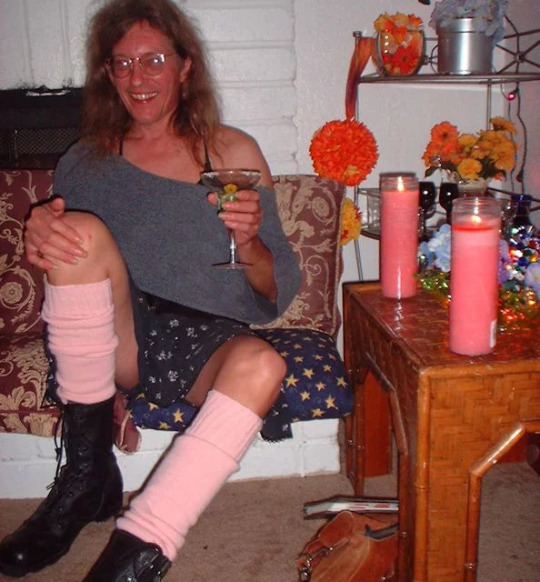
Gigi Raven Wilbur
Gender: Third gender (they/them)
Sexuality: Bisexual
DOB: 23 September 1955
Ethnicity: White - American
Occupation: Activist, writer
Note: Is Intersex
#Gigi Raven Wilbur#lgbt#lgbtqia#intersexuality#bisexuality#non binary#third gender#bisexual#1955#white#activist#writer#intersex#popular post#popular
117 notes
·
View notes
Text
I have a serious question for Transfolk. What's next?
After there is global acceptance of trans people, after everyone is allowed to change their gender with no limitations. After it's put into laws that you can be trans, or genderfluid or non-binary, what's next?
What will changing your gender and refusing to be called a woman or man change. We'll still need a categorization for medical purposes, we'll need to know your sex when checking for symptoms of heart attack. You've created a more inclusive term "uterus havers", "menstruators" etc but how are these different from man/woman. Are uterus havers still not going to suffer from a gross misrepresentation in medical research, when they're in a car accident in a car that was trained on a penis haver dummy's body, will they not suffer like cis-women?
In a fight for more inclusive language regardless of equality/equity, are the people transitioning in and out not still sticking and benefiting/suffering from the same thing as their assigned birth gender. Rape statistics would just change to 90% of uterus havers instead of women. Already we see a difference between TW and TM when it comes to publicity and privilege, the patriarchy has automatically shifted to favour TW while TM only enjoy the reminiscent bystander privilege in the male class. When patriarchy accepts the existence of transfolk, it's just going to start benefiting people under a new name "penis-haver". Already the rapists, victim of rapists, incarcerated fellow for violent crime kind of follow the same pattern as their birth gender, when shelters for uterus havers who have suffered trauma from penis-havers pop up. What exactly is the difference? What exactly will change?
There's a push to normalize transwomen with dicks, feminine transmen, gender conforming nb people. No transition is needed to live your gender. Which is normal, a gender is not defined by clothes or structure but how is this different from the "boys can be feminine, women can be masculine" movement?
And what exactly is the plan to minimize the utter trainwreck that misogynists, capitalists etc are going to make of things while society makes a full transition. When a medication claims to be tested on both men and women and it was actually just tested on cis-men and trans-women and cis-women and trans-men suffer dearly. What language are we going to use to take them to court for violating the law?
#radfem#transgirl#trans man#terf#tirf#transwomen#radical feminists please touch#trans rights#trans right activist please interact#trans folks#non binary#gender fluid
76 notes
·
View notes
Text

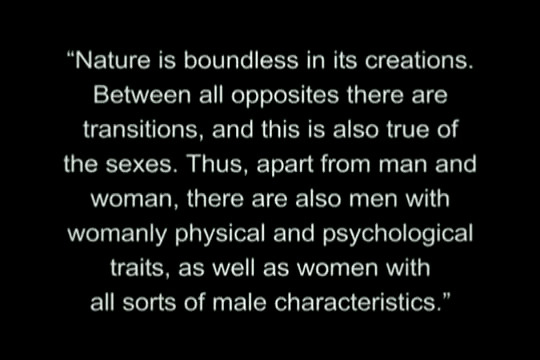



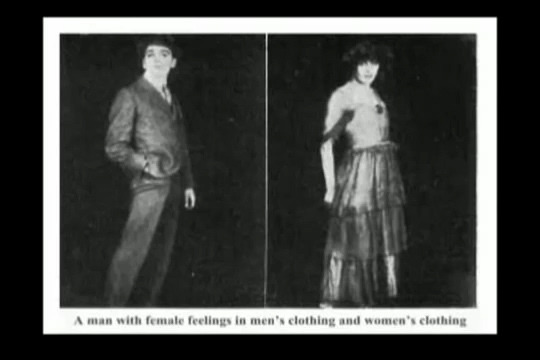
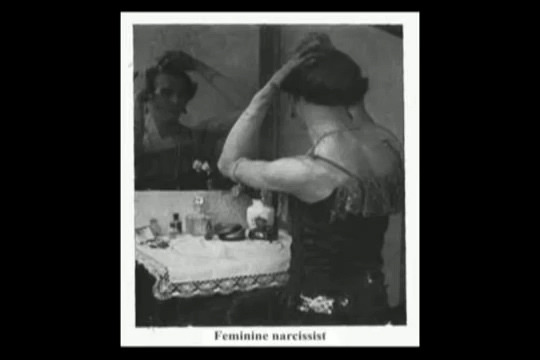


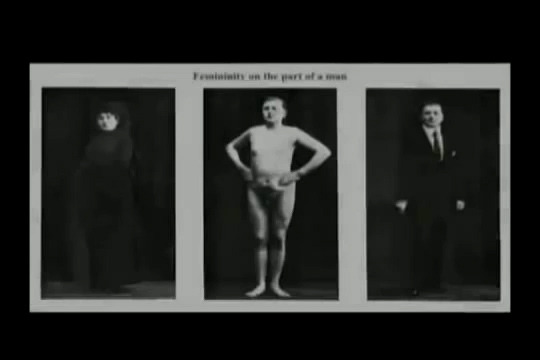
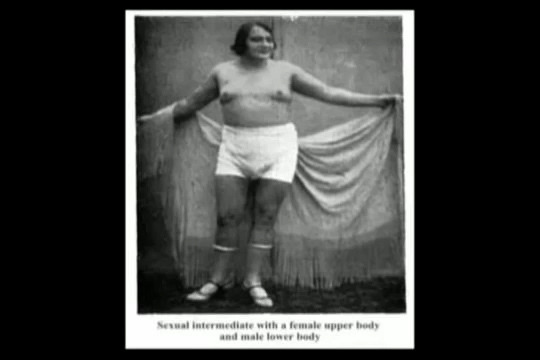




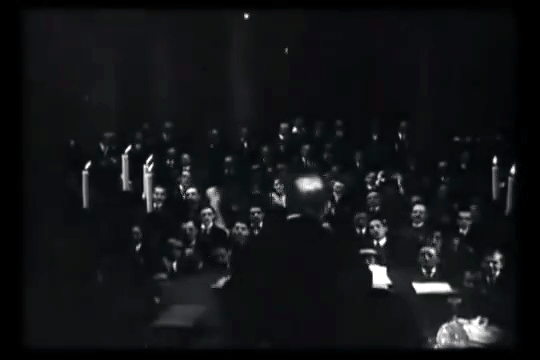
Dr. Magnus Hirschfeld lecturing on sexology in Different From the Others (1919 dir. Richard Oswald), a silent film arguing against German legal code Section 175, which criminalized homosexuality. Parts of the film are lost due to the later Nazi government's attempt to destroy all copies of it.
#pictures of queer people from decades ago and in this case over a hundred years ago make me so. like. god#also watching this film and realizing that was the actual magnus hirschfeld on film trying to educate people on gender & sexuality#as early as 1919. fucking hell man!!#also wanted to add that last gif to really emphasize how many people wanted to work on this film. how many people sat in that lecture hall#to be a part of making this activist film about normalizing queerness. in 1919. that's so many people#ntm crew and the other actors and everyone who pieced it back together when it was burned#and translated it#and made the cards in between saying what was supposed to happen in the lost scenes#:(#cricket gifs#magnus hirschfeld#different from the others#long post#queer history#lgbt#lgbt history
120 notes
·
View notes